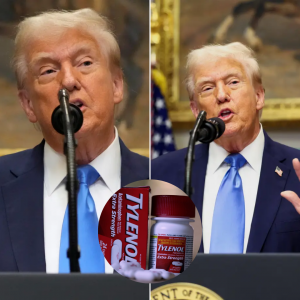WASHINGTON — President Trump urged pregnant women Monday to stop taking Tylenol, saying studies have shown that taking the common painkiller is associated with autism in children.
“With Tylenol, don’t take it! Don’t take it,” Trump told reporters from the Roosevelt Room of the White House, in which he gave his opinion about pregnancy, women’s health, vaccinations, drug safety and autism.
He added: “Ideally, you don’t take it all, but if you have to, if you can’t tough it out, if there’s a problem, you’re going to end up doing it.”
Trump said that the only time pregnant women should take Tylenol, a common form of acetaminophen, is during a high-risk fever.

The new recommendation is at odds with physician groups, who say the drug — which has been on the market for 70 years — is safe. More than 50% of women report taking the drug during pregnancy, because it has long been regarded as the safest analgesic.
However, the Trump administration is pointing to a growing body of research that suggests a connection between autism in children and the use of acetaminophen during pregnancy.
In particular, a Mount Sinai and Harvard University study published in August reviewed the existing literature and concluded that a large majority of studies on the topic found autism diagnosis was more likely for expectant mothers who took acetaminophen.
Health and Human Services Secretary Robert F. Kennedy Jr. is also recommending children who are exhibiting signs of autism take leucovorin, which helps correct folate deficiencies. Low levels of folate in pregnant mothers have been associated with neurological disorders in children, some studies show.
While not a cure, HHS said the drug may lead to speech improvements for children with autism.
The FDA will be updating the label on acetaminophen to relay the risk in pregnancy and will be sending out a letter to all doctors with the warning.

The agency will be notifying physicians against the use of acetaminophen “effective immediately,” Trump said, noting that kids should also not be given the drug.
Kenvue, the manufacturer of Tylenol, disputed the president’s announcement.
“The facts are that over a decade of rigorous research, endorsed by leading medical professionals and global health regulators, confirms there is no credible evidence linking acetaminophen to autism,” a Kenvue spokesperson said in a statement.
“We stand with the many public health and medical professionals who have reviewed this science and agree. We will continue to explore all options to protect the health interests of American women and children.”
Trump had called on the US Department of Health and Human Services, led by Secretary Robert F. Kennedy Jr., and some of its subagencies to look into the causes of autism in the US, which he said is “among the most alarming public health developments in history.”
Rates of autism have risen 400% since 2000 and 1 in 31 American children are now affected.



The White House cited data from studies showing there is “consistent associations between acetaminophen in pregnancy and autism” from researchers at Johns Hopkins known as the Boston Birth Cohort. The Nurses Health Study, with researchers from Yale, Columbia and Harvard Universities, looked at 9,000 kids and found that there is an association between acetaminophen and neurodevelopmental disorders, the White House said.
On Monday, the National Institutes of Health (NIH) also announced the launch of the Autism Data Science Initiative, a $50 million research effort that will draw on 13 projects and analyze data on autism, including potential causes like diet, air pollutants and psychological stress.
“Our Autism Data Science Initiative will unite powerful datasets in ways never before possible,” said NIH Director Dr. Jay Bhattacharya. “By bringing together genetics, biology, and environmental exposures, we are opening the door to breakthroughs that will deepen our understanding of autism and improve lives.”
HHS also released a statement with a caveat that a causal relationship has not been established.
“It is important to note that while an association between acetaminophen and neurological conditions has been described in many studies, a causal relationship has not been established and there are contrary studies in the scientific literature,” the HHS statement read.
Trump also encouraged parents to spread out the time period over which their child takes all vaccines on the federal schedule, while noting he wasn’t “a doctor, but I’m giving my opinion.”


“You have a little child, little fragile child, and you get a vat of 80 different vaccines, I guess, 80 different blends, and they pump it in. So ideally, a woman won’t take Tylenol, and on the vaccines, it would be good instead of one visit where they pump the baby, you load it up with stuff, you do it over a period of four times or five times,” he said.
Trump specifically said the Hepatitis B vaccine should not be administered to children until they are 12, and that vaccines should be “spread out” in various visits.
The president also pointed to the Amish population having lower rates of autism and chronic disease, something he attributed potentially to their lower use of vaccines and painkillers.
“You have a little child, little fragile child, and you get a vat of 80 different vaccines, I guess, 80 different blends, and they pump it in. So ideally, a woman won’t take Tylenol, and on the vaccines, it would be good instead of one visit where they pump the baby, you load it up with stuff, you do it over a period of four times or five times,” Trump said.





